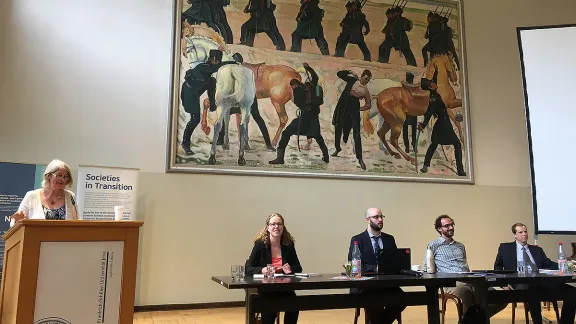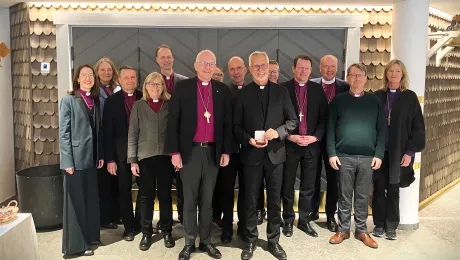
At the University of Jena conference, Rev. Dr Miriam Haar (left at table with panelists) joined theologians from around the world exploring the impact of the Reformation beyond European churches and societies. Photo: Aaron T. Hollander
I contributed to an international ecumenical conference in June this year, where the question was brought up several times about the kind of ecumenism that is needed today on our journey toward reconciliation.
The event, jointly organized by the Ecclesiological Investigations International Research Network and the Center for Reconciliation Studies at the University of Jena, Germany, with partners such as The Lutheran World Federation (LWF), explored the Reformation as a global event with impact beyond European churches and societies. Indeed, the long-term effect of the sixteenth century movement to reform the church can be seen today in all four corners of the Earth.
The participants from around the globe were drawn from theological institutions and represented various ecclesial backgrounds: Anglican, Lutheran and other Protestant confessions, Roman Catholic and Orthodox. Under the main theme, “Reformation and Global reconciliation,” we discussed the notion of the Reformation as an ecumenical event both in terms of history and for today. We also looked at the historical and recent studies on the contribution of Protestant churches to the ecumenical movement, along with the responses by Roman Catholics and Orthodox to these studies as well as their interaction with the ecumenical movement.
On one panel we discussed the Lutheran–Mennonite and the Lutheran–Roman Catholic international dialogues, both of which have led to ecumenical milestones. The Lutheran–Mennonite dialogue resulted in the reconciliation between Lutherans and Mennonites, the so-called “Mennonite Action” in Stuttgart, Germany (2010) and the Lutheran–Roman Catholic dialogue led to the Joint Declaration on the Doctrine of Justification in Augsburg, Germany (1999) and the Joint Catholic-Lutheran Commemoration of the Reformation in Lund, Sweden (2016). The latter event was extensively covered in media and the publication about the process, From Conflict to Communion, has been received more widely by churches than any other recent theological dialogue document.
It comes as no surprise then that some people argue that what is needed today are symbolic events and strong signals from church leaders, such as the widely shared photograph of Pope Francis hugging the Church of Sweden Archbishop Antje Jackelén at the October 2016 prayer service in Lund Cathedral. These kinds of images seem to impress people more and drive messages about reconciliation by transcending professional ecumenism.
Ecumenical events did not come out of the blue, rather they are the results of decades of ecumenical dialogue. In my opinion, the strong symbols and theological dialogue are not contradictory but complementary, and we need both on our journey toward reconciliation.
Yet others contend that it is theological dialogue that brings about sustainable and long lasting ecumenical progress. Ecumenical events did not come out of the blue, rather they are the results of decades of ecumenical dialogue. In my opinion, the strong symbols and theological dialogue are not contradictory but complementary, and we need both on our journey toward reconciliation.
Rev. Dr Miriam Haar is the Theological Assistant at the LWF Department for Theology and Public Witness (DTPW). She is an ordained pastor of the Evangelical Lutheran Church in Württemberg, Germany.


